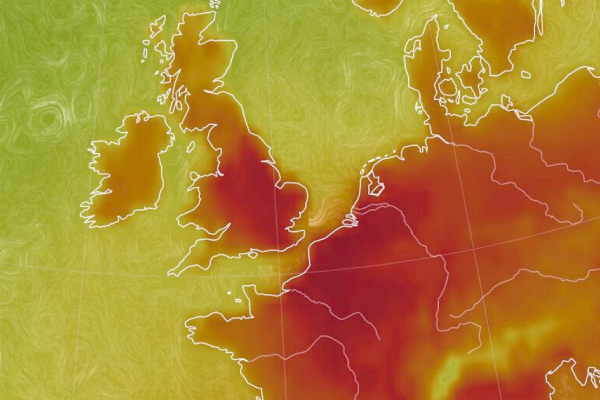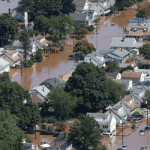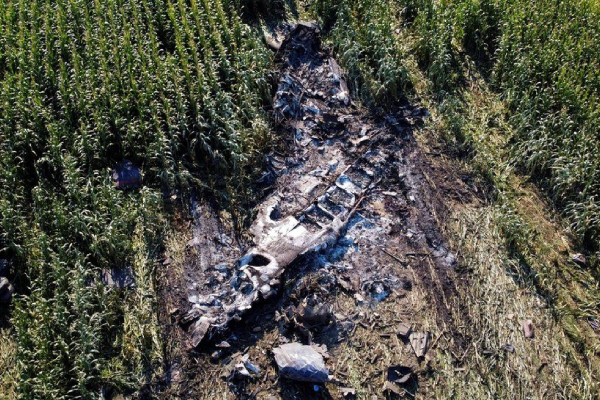A national emergency has been declared in the UK after a red extreme heat warning was issued for the first time.
Officials say temperatures could hit 40 degrees centigrades.
The Meteorological Office’s highest warning covers an area including London, Manchester and York on Monday and Tuesday.
It means there is a risk to life and daily routines will need to change.
[wonderplugin_video iframe=”https://youtu.be/gFyd3fnVMz8″ lightbox=0 lightboxsize=1 lightboxwidth=960 lightboxheight=540 autoopen=0 autoopendelay=0 autoclose=0 lightboxtitle=”” lightboxgroup=”” lightboxshownavigation=0 showimage=”” lightboxoptions=”” videowidth=600 videoheight=400 keepaspectratio=1 autoplay=0 loop=0 videocss=”position:relative;display:block;background-color:#000;overflow:hidden;max-width:100%;margin:0 auto;” playbutton=”https://www.tvcnews.tv/wp-content/plugins/wonderplugin-video-embed/engine/playvideo-64-64-0.png”]
Speed restrictions are likely on railway lines, some schools will close early and some hospital appointments will be cancelled.
The UK Health Security Agency has also issued its highest level four heat alert to healthcare bodies – warning that illness and death could occur among the fit and healthy.
Earlier this week, the prime minister’s spokesman stated that “tried and tested” plans to increase NHS staffing in various areas are in place, and that some government coordination has already taken place to put mitigations and actions in place.
Following Saturday’s COBRA meeting, Cabinet Office minister Kit Malthouse confirmed that the priority was to “prepare” government services.
The highest ever recorded temperature in Britain was 38.7C recorded in Cambridge University Botanic Garden on July 25, 2019.
A national emergency has been declared in the UK after a red extreme heat warning was issued for the first time.
Officials say temperatures could hit 40 degrees centigrades.
The Meteorological Office’s highest warning covers an area including London, Manchester and York on Monday and Tuesday.
It means there is a risk to life and daily routines will need to change.
[wonderplugin_video iframe=”https://youtu.be/gFyd3fnVMz8″ lightbox=0 lightboxsize=1 lightboxwidth=960 lightboxheight=540 autoopen=0 autoopendelay=0 autoclose=0 lightboxtitle=”” lightboxgroup=”” lightboxshownavigation=0 showimage=”” lightboxoptions=”” videowidth=600 videoheight=400 keepaspectratio=1 autoplay=0 loop=0 videocss=”position:relative;display:block;background-color:#000;overflow:hidden;max-width:100%;margin:0 auto;” playbutton=”https://www.tvcnews.tv/wp-content/plugins/wonderplugin-video-embed/engine/playvideo-64-64-0.png”]
Speed restrictions are likely on railway lines, some schools will close early and some hospital appointments will be cancelled.
The UK Health Security Agency has also issued its highest level four heat alert to healthcare bodies – warning that illness and death could occur among the fit and healthy.
Earlier this week, the prime minister’s spokesman stated that “tried and tested” plans to increase NHS staffing in various areas are in place, and that some government coordination has already taken place to put mitigations and actions in place.
Following Saturday’s COBRA meeting, Cabinet Office minister Kit Malthouse confirmed that the priority was to “prepare” government services.
The highest ever recorded temperature in Britain was 38.7C recorded in Cambridge University Botanic Garden on July 25, 2019.
A national emergency has been declared in the UK after a red extreme heat warning was issued for the first time.
Officials say temperatures could hit 40 degrees centigrades.
The Meteorological Office’s highest warning covers an area including London, Manchester and York on Monday and Tuesday.
It means there is a risk to life and daily routines will need to change.
[wonderplugin_video iframe=”https://youtu.be/gFyd3fnVMz8″ lightbox=0 lightboxsize=1 lightboxwidth=960 lightboxheight=540 autoopen=0 autoopendelay=0 autoclose=0 lightboxtitle=”” lightboxgroup=”” lightboxshownavigation=0 showimage=”” lightboxoptions=”” videowidth=600 videoheight=400 keepaspectratio=1 autoplay=0 loop=0 videocss=”position:relative;display:block;background-color:#000;overflow:hidden;max-width:100%;margin:0 auto;” playbutton=”https://www.tvcnews.tv/wp-content/plugins/wonderplugin-video-embed/engine/playvideo-64-64-0.png”]
Speed restrictions are likely on railway lines, some schools will close early and some hospital appointments will be cancelled.
The UK Health Security Agency has also issued its highest level four heat alert to healthcare bodies – warning that illness and death could occur among the fit and healthy.
Earlier this week, the prime minister’s spokesman stated that “tried and tested” plans to increase NHS staffing in various areas are in place, and that some government coordination has already taken place to put mitigations and actions in place.
Following Saturday’s COBRA meeting, Cabinet Office minister Kit Malthouse confirmed that the priority was to “prepare” government services.
The highest ever recorded temperature in Britain was 38.7C recorded in Cambridge University Botanic Garden on July 25, 2019.
A national emergency has been declared in the UK after a red extreme heat warning was issued for the first time.
Officials say temperatures could hit 40 degrees centigrades.
The Meteorological Office’s highest warning covers an area including London, Manchester and York on Monday and Tuesday.
It means there is a risk to life and daily routines will need to change.
[wonderplugin_video iframe=”https://youtu.be/gFyd3fnVMz8″ lightbox=0 lightboxsize=1 lightboxwidth=960 lightboxheight=540 autoopen=0 autoopendelay=0 autoclose=0 lightboxtitle=”” lightboxgroup=”” lightboxshownavigation=0 showimage=”” lightboxoptions=”” videowidth=600 videoheight=400 keepaspectratio=1 autoplay=0 loop=0 videocss=”position:relative;display:block;background-color:#000;overflow:hidden;max-width:100%;margin:0 auto;” playbutton=”https://www.tvcnews.tv/wp-content/plugins/wonderplugin-video-embed/engine/playvideo-64-64-0.png”]
Speed restrictions are likely on railway lines, some schools will close early and some hospital appointments will be cancelled.
The UK Health Security Agency has also issued its highest level four heat alert to healthcare bodies – warning that illness and death could occur among the fit and healthy.
Earlier this week, the prime minister’s spokesman stated that “tried and tested” plans to increase NHS staffing in various areas are in place, and that some government coordination has already taken place to put mitigations and actions in place.
Following Saturday’s COBRA meeting, Cabinet Office minister Kit Malthouse confirmed that the priority was to “prepare” government services.
The highest ever recorded temperature in Britain was 38.7C recorded in Cambridge University Botanic Garden on July 25, 2019.
A national emergency has been declared in the UK after a red extreme heat warning was issued for the first time.
Officials say temperatures could hit 40 degrees centigrades.
The Meteorological Office’s highest warning covers an area including London, Manchester and York on Monday and Tuesday.
It means there is a risk to life and daily routines will need to change.
[wonderplugin_video iframe=”https://youtu.be/gFyd3fnVMz8″ lightbox=0 lightboxsize=1 lightboxwidth=960 lightboxheight=540 autoopen=0 autoopendelay=0 autoclose=0 lightboxtitle=”” lightboxgroup=”” lightboxshownavigation=0 showimage=”” lightboxoptions=”” videowidth=600 videoheight=400 keepaspectratio=1 autoplay=0 loop=0 videocss=”position:relative;display:block;background-color:#000;overflow:hidden;max-width:100%;margin:0 auto;” playbutton=”https://www.tvcnews.tv/wp-content/plugins/wonderplugin-video-embed/engine/playvideo-64-64-0.png”]
Speed restrictions are likely on railway lines, some schools will close early and some hospital appointments will be cancelled.
The UK Health Security Agency has also issued its highest level four heat alert to healthcare bodies – warning that illness and death could occur among the fit and healthy.
Earlier this week, the prime minister’s spokesman stated that “tried and tested” plans to increase NHS staffing in various areas are in place, and that some government coordination has already taken place to put mitigations and actions in place.
Following Saturday’s COBRA meeting, Cabinet Office minister Kit Malthouse confirmed that the priority was to “prepare” government services.
The highest ever recorded temperature in Britain was 38.7C recorded in Cambridge University Botanic Garden on July 25, 2019.
A national emergency has been declared in the UK after a red extreme heat warning was issued for the first time.
Officials say temperatures could hit 40 degrees centigrades.
The Meteorological Office’s highest warning covers an area including London, Manchester and York on Monday and Tuesday.
It means there is a risk to life and daily routines will need to change.
[wonderplugin_video iframe=”https://youtu.be/gFyd3fnVMz8″ lightbox=0 lightboxsize=1 lightboxwidth=960 lightboxheight=540 autoopen=0 autoopendelay=0 autoclose=0 lightboxtitle=”” lightboxgroup=”” lightboxshownavigation=0 showimage=”” lightboxoptions=”” videowidth=600 videoheight=400 keepaspectratio=1 autoplay=0 loop=0 videocss=”position:relative;display:block;background-color:#000;overflow:hidden;max-width:100%;margin:0 auto;” playbutton=”https://www.tvcnews.tv/wp-content/plugins/wonderplugin-video-embed/engine/playvideo-64-64-0.png”]
Speed restrictions are likely on railway lines, some schools will close early and some hospital appointments will be cancelled.
The UK Health Security Agency has also issued its highest level four heat alert to healthcare bodies – warning that illness and death could occur among the fit and healthy.
Earlier this week, the prime minister’s spokesman stated that “tried and tested” plans to increase NHS staffing in various areas are in place, and that some government coordination has already taken place to put mitigations and actions in place.
Following Saturday’s COBRA meeting, Cabinet Office minister Kit Malthouse confirmed that the priority was to “prepare” government services.
The highest ever recorded temperature in Britain was 38.7C recorded in Cambridge University Botanic Garden on July 25, 2019.
A national emergency has been declared in the UK after a red extreme heat warning was issued for the first time.
Officials say temperatures could hit 40 degrees centigrades.
The Meteorological Office’s highest warning covers an area including London, Manchester and York on Monday and Tuesday.
It means there is a risk to life and daily routines will need to change.
[wonderplugin_video iframe=”https://youtu.be/gFyd3fnVMz8″ lightbox=0 lightboxsize=1 lightboxwidth=960 lightboxheight=540 autoopen=0 autoopendelay=0 autoclose=0 lightboxtitle=”” lightboxgroup=”” lightboxshownavigation=0 showimage=”” lightboxoptions=”” videowidth=600 videoheight=400 keepaspectratio=1 autoplay=0 loop=0 videocss=”position:relative;display:block;background-color:#000;overflow:hidden;max-width:100%;margin:0 auto;” playbutton=”https://www.tvcnews.tv/wp-content/plugins/wonderplugin-video-embed/engine/playvideo-64-64-0.png”]
Speed restrictions are likely on railway lines, some schools will close early and some hospital appointments will be cancelled.
The UK Health Security Agency has also issued its highest level four heat alert to healthcare bodies – warning that illness and death could occur among the fit and healthy.
Earlier this week, the prime minister’s spokesman stated that “tried and tested” plans to increase NHS staffing in various areas are in place, and that some government coordination has already taken place to put mitigations and actions in place.
Following Saturday’s COBRA meeting, Cabinet Office minister Kit Malthouse confirmed that the priority was to “prepare” government services.
The highest ever recorded temperature in Britain was 38.7C recorded in Cambridge University Botanic Garden on July 25, 2019.
A national emergency has been declared in the UK after a red extreme heat warning was issued for the first time.
Officials say temperatures could hit 40 degrees centigrades.
The Meteorological Office’s highest warning covers an area including London, Manchester and York on Monday and Tuesday.
It means there is a risk to life and daily routines will need to change.
[wonderplugin_video iframe=”https://youtu.be/gFyd3fnVMz8″ lightbox=0 lightboxsize=1 lightboxwidth=960 lightboxheight=540 autoopen=0 autoopendelay=0 autoclose=0 lightboxtitle=”” lightboxgroup=”” lightboxshownavigation=0 showimage=”” lightboxoptions=”” videowidth=600 videoheight=400 keepaspectratio=1 autoplay=0 loop=0 videocss=”position:relative;display:block;background-color:#000;overflow:hidden;max-width:100%;margin:0 auto;” playbutton=”https://www.tvcnews.tv/wp-content/plugins/wonderplugin-video-embed/engine/playvideo-64-64-0.png”]
Speed restrictions are likely on railway lines, some schools will close early and some hospital appointments will be cancelled.
The UK Health Security Agency has also issued its highest level four heat alert to healthcare bodies – warning that illness and death could occur among the fit and healthy.
Earlier this week, the prime minister’s spokesman stated that “tried and tested” plans to increase NHS staffing in various areas are in place, and that some government coordination has already taken place to put mitigations and actions in place.
Following Saturday’s COBRA meeting, Cabinet Office minister Kit Malthouse confirmed that the priority was to “prepare” government services.
The highest ever recorded temperature in Britain was 38.7C recorded in Cambridge University Botanic Garden on July 25, 2019.














